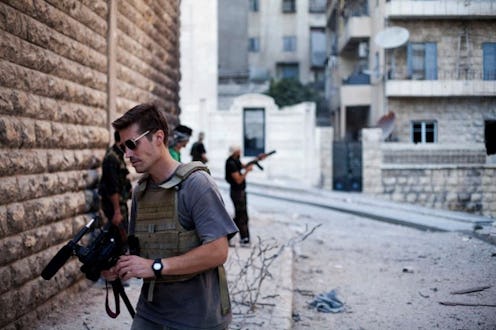News
ISIS Wanted $100 Million For James Foley

The U.S. military's attempt to save captured American photojournalist James Foley — whose gruesome killing, videotaped and published on Tuesday, will haunt the American public — wasn't the only chance to save the reporter's life. According to a report by the Wall Street Journal, the blood-curdling terrorist group Islamic State of Iraq and the Levant, better known as ISIS, asked for ransom money in exchange for Foley's life. The price? Over $100 million.
On Wednesday, the Department of Defense described, in vague terms, its failed mission to save a number of American hostages, including Foley, being held in Syria. The operation — the first secret U.S. military operation in the country since Syria's civil war began — was a bust. "The mission was not successful because the hostages were not present at the targeted location," Pentagon Press Secretary Navy Rear Adm. John Kirby said in a statement.
Only a day later, it was revealed that the U.S. had another way to get Foley out of there: cash. Philip Balboni, the president of GlobalPost (the news site that Foley wrote for) told the WSJ that ISIS had demanded money — $132.5 million — from both Foley's family and the news site itself, in exchange for the reporter's life. (This, in spite of the fact that the terrorist group called Foley's execution a response to recent U.S. airstrikes in Iraq.) As it turns out, demanding money for prisoners is common move in the terrorist scene.
Alongside its other horrifying activities (including but not limited to: publicly stoning women, flogging children and mass decapitations), ISIS has been raking in substantial amounts of money with its kidnappings. In fact, according to Business Insider, for a long time, the terrorist group relied solely on ransom money for its survival. The New York Times reports that "kidnapping Europeans has become the main source of revenue for Al Qaeda and its affiliates, which have earned at least $125 million in ransom payments in the past five years alone." Why specifically Europeans? Because America doesn't negotiate with terrorists.
As David Rohde points out in The Atlantic, this creates a major, intractable problem: As long as certain governments keep paying for hostages, terrorists will keep kidnapping (it's lucrative, after all). So while their European counterparts will be freed, thanks to their governments (unofficially) paying up, American captives are forced to sit and wait while the administration sticks to its principles. Which isn't to say that the U.S. should be giving into ransom demands, only that the chasm between American foreign policy and European foreign policy is ultimately costing lives. "A consistent response to kidnapping by the U.S. and Europe is desperately needed. The current haphazard approach is failing," says Rohde.
Right now, three other Americans are being held captive by ISIS, according to the Times. As in the case of Foley, their lives are at stake: If the terrorist group's demands aren't met, the U.S. citizens will be killed. In the chilling video of Foley's murder, ISIS singles out one American captive in particular: Steven J. Sotloff, a journalist for Time magazine. “The life of this American citizen, Obama, depends on your next decision,” the video caption reads.
Images: Nicole Tung/Facebook; FindJamesFoley/Facebook